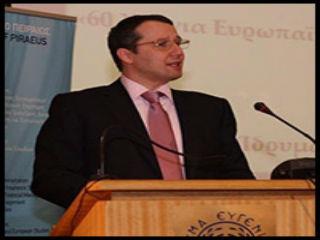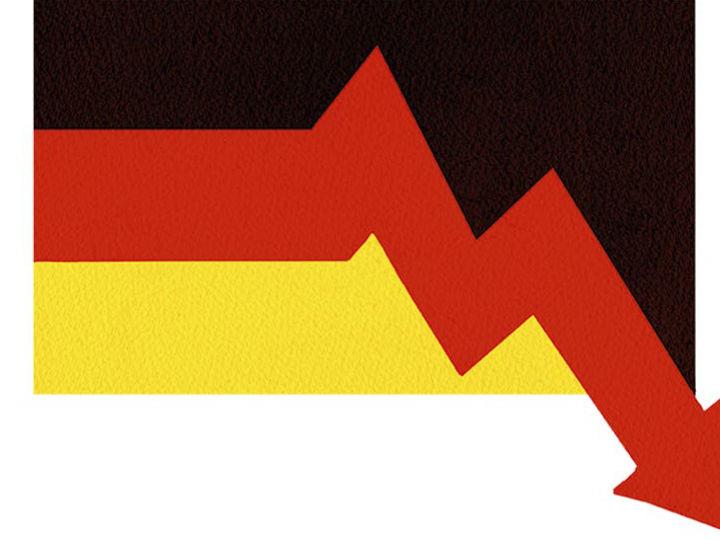By
Alexandra Papaisidorou**
This is the newest installment in our series interviewing distinguished academics and scholars.
EBR conducted the interview in October 2018 in order for it to coincide with the 80th anniversary of the founding of the University of Piraeus.
Answering our questions was
Dr. Aristotle Tziampiris, Professor of International Relations at the University of Piraeus, Director of the MSc Program on Energy: Strategy, Law & Economics and Chair of the Department of International and European Studies. His Department is by far the most selective International Relations, International Studies and Political Science Department in Greece.
The long-awaited, exclusive and fast paced interview took place at his University office. EBR asked wide-ranging questions on hot topics relating to global politics and finance, the European Union, developments in the Eastern Mediterranean and the future of Greece.
EU – Never mind Brexit or Trump’s re-election chances, 2019 is shaping to be the year Europe’s populists shake the EU to its foundations. How do you see Europe after the EP elections in May 2019?
I am going to be a little contrarian on this and let me explain why: First, participation. Although we do not know the results, we can be absolutely certain- that participation is actually going to be very low.
Of course, citizens ought to vote and I encourage everyone to do so, but not that many will. Hence, how can one reach any solid political conclusions, especially since it is often the case that it is the devoted single issue voters who tend to participate? Second, despite sharing the same name, the European Parliament is not equivalent to national Parliaments.
Its powers are far more limited. In that sense, what happens there is not as consequential as what happens in key European states. And third, the European Union also has other institutions such as the European Council in what amounts to a very complicated decision making structure and that is not changing anytime soon. So even if populist forces rise, I really doubt that the upcoming European elections are going to constitute any sort of a turning point.
Having said that, there is a wider trend that has to be highlighted, understood and perhaps even combated. It is, as you very correctly alluded to, the rise of populism and more generally, the rise of nationalism. This is not a phenomenon that we witness only in Europe, but also in other countries such as Brazil, the Philippines even the United States for that matter.
This rise should not automatically or necessarily be equated with more extreme movements and ideologies. Nevertheless, it constitutes a historical fact characterising this part of the 21st century. I suspect that it is ultimately related to larger forces such as globalization, automation, A.I. and climate change.
So there are structural, mega trends, well underway, that turn people perhaps more inward, certainly in search of change and probably against what is unfamiliar. These people are susceptible to politicians who promise (and possibly over-sell) national solutions to problems that are truly global.
If this analysis is correct, although the European elections are not going to be a turning point, the forces of nationalism and populism are here to stay for the foreseeable future because they are linked to larger global developments.
GREECE – Greece finally managed to exit the “memoranda era”. Are we back to normal? What steps should still be made in order to avoid a new upset?
Let me put it this way: the worst for Greece is over. Things are undoubtedly improving. However, the crisis lasted too long, unnecessarily so, and it had tremendous social and economic costs: people losing their jobs, lives and dreams being destroyed, a seemingly endless brain drain. Greece paid a very heavy price, lost a quarter of its GDP and unemployment even today hovers at around 19% and is much higher for young people.
But I am optimistic. Greece is turning a page, which is not to say that things have become rosy or perfect or easy. Are we back to normal? I hope not. Because a lot of the practices that led us to the crisis have to stop and will stop. People often tend to highlight the difficulties in investing or the often-cumbersome bureaucracy, but they forget that Greece has actually gone through a lot of reforms. Significant, far-reaching reforms have been legislated and are being implemented.
Equally important, young people in Greece--and I see this every day with my students--they have a different set of expectations, they have a different set of standards, they have a different understanding of what they want. I hear them say "Oh, that practice, that is old Greece” even though we are talking about only 8 or 10 years ago. So in that sense, we are not back to normal because the people demand a society that is more meritocratic and efficient.
At the same time, when it comes to international relations and diplomacy, Athens is actually getting back to the old normal. At the height of the crisis, Greece was facing existential threats: Would it continue to be a member of the Eurozone and the European Union? Would the social fabric unravel? Would extremist parties become the largest? The answer to all these threats materializing turned out to be negative.
During the same period, a lot of “traditional” issues for Greek foreign policy, such as the Macedonian name dispute or relations with Turkey and Albania, were mostly put on the back burner. Greece was weak, turning inward, and hardly a threat to anyone. That was not the time to address them, or for the international community to really push on any of them. Now that we are exiting the crisis, when it comes to diplomacy we are slowly witnessing the return of the old issues--with a vengeance.
EAST – MED: As referred to your recent book “Due to recent events in contemporary international politics, the Eastern Mediterranean can be seen as a laboratory where the balance of power among Great Powers and regional states are being tested.” What are the latest developments and prospects of this special part of the world? How significant is the role of the energy issues?
In many ways, the Eastern Mediterranean has emerged as a “new” region. Not because its geography has changed--it has remained the same for eons. But rather because of a new set of issues that did not exist even a few years ago. Let me name a few of them: huge energy findings, a migration or more correctly, a huge refugee crisis and the deadly civil war still raging in Syria, that has included the use of chemical weapons, the rise (and now partial fall) of ISIS and sectarian classes by proxy.
It is these issues that have given global importance to the Eastern Mediterranean and have prompted Great powers such China, Russia and the United States, as well as important regional actors such as Israel, Turkey Iran, even Saudi Arabia to refocus their attention to this part of the world.
In this sense, the Eastern Mediterranean can be seen as a laboratory for Great Power and regional power antagonisms; and we have to keep in mind that the Eastern Mediterranean is where “East” meets “West”, it is a frontier area with global significance.
WORLD ECONOMY – A decade passed from the global financial crisis in 2008. What has and what hasn’t change? Which are the main risks that have now emerged?
In retrospect, we understand that what happened in 2008 had wide-ranging global political and economic repercussions. Today the United States economy shows good growth and record low unemployment rates, while the European Union, as a whole, is also doing reasonably well. The crisis has clearly ended, although some of the political consequences, such as the rise of populism, have stayed with us.
Of course, capitalism is a cyclical system and there is bound to be another recession at some point. Let us hope that it is not going to be as harsh or as long as the previous global one; and let us hope that lessons have been learned.
A few months ago I was at a conference panel with a former UK Prime Minister and he asked me what was Greece doing to prepare itself for the next recession? It was a wise question and an even wiser approach. We are usually fighting the battles of the past or busy forgetting about it when we need to focus on the future.
TURKEY – One of his latest speeches was full of the term ‘New Turkey’ (it was recorded to be referred about 20 times), Tayip Erdogan appears to 'claim victory in vote to gain new powers' and we are all witnessed that there is a change in regime from cosmic to Islamic thus aggressive and of course it goes along with a Turkish brain drain – your insight on that please.
I think that President Erdogan is absolutely right when he talks about a new Turkey. The question is what is new about it and in my view the new Turkey is less secular, more authoritarian and less reliable as a Western ally. This poses all sorts of challenges not only for NATO, but also for countries like Greece.
As Turkey becomes a less predictable actor, other regional states have decided to cooperate more closely. Witness the two dynamic trilateral processes underway in the Eastern Mediterranean, the first involving Israel, Greece and Cyprus and the second Egypt, Greece and Cyprus. Consider the former as an axis of democracies and the latter as an axis of stability.
These initiatives are not targeting Turkey but are a form of “insurance” towards Turkish unpredictability. In fact, one can even foresee in the future a very different Turkey partaking in them.
Smaller regional cooperating processes are particularly useful because a lot of the contemporary challenges and infrastructure projects require multi-state cooperation. To give an example, for the East Med natural gas pipeline to be built, excellent coordination and relations are required between Israel, Greece, Cyprus and Italy.
There is also a larger conclusion here. In the past few years we have been witnessing the rise of smaller regional groupings, especially among Western oriented states. NATO remains paramount and it still delivers some very important, big things. But given NATO’s unanimity requirement and an increasing membership there is an incentive for regional states to cooperate among themselves on more specific and narrow issue areas where mutual interests exist.
Regions are thus going to become even more important, coming to the very forefront of international politics in the 21st century.
* Dr. Aristotle Tziampiris is Professor of International Relations, Chair of the Department of International and European Studies and Director of the MSc Program in Energy: Strategy, Law & Economics at the University of Piraeus.
He is also Standing Fellow at New York University's Remarque Institute, member of the Executive Academic Board of the European Security and Defence College (ESDC), Academic Advisor to the Hellenic American Leadership Council (HALC), Academic Coordinator for the Erasmus+ "Eastern Mediterranean Regional Training Partnership" Program and Examiner for the course International Relations and Politics for the entrance examinations of the Hellenic Diplomatic Academy.
*Dr. Tziampiris has published a series of essays primarily on international relations and Greek foreign policy in the Balkans and the Eastern Mediterranean. His op-ed pieces have appeared in various publications and websites, including The New York Times, The Jerusalem Post, The Huffington Post, The Washington Times and the National Interest. He holds PhD and MSc (econ) degrees from the London School of Economics and Political Science and is a graduate (BA) of Middlebury College.
**Editor-at-large & PhD candidate of European & International Relations




 By: N. Peter Kramer
By: N. Peter Kramer

